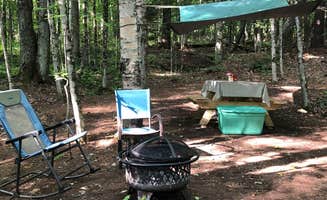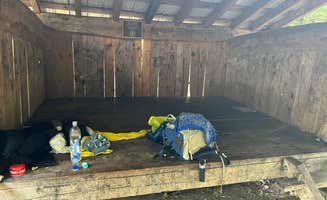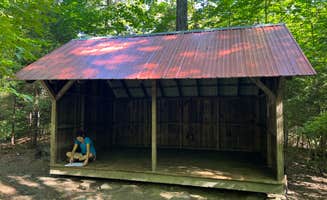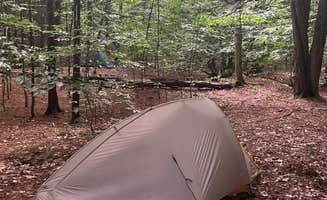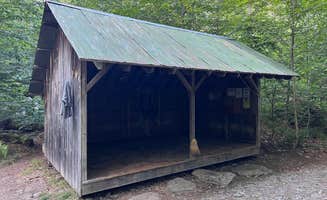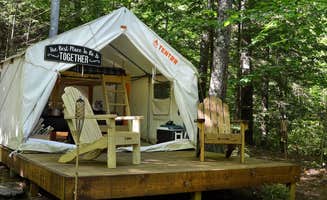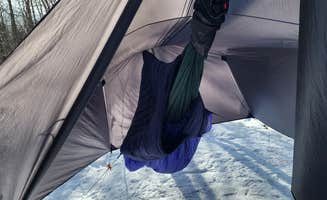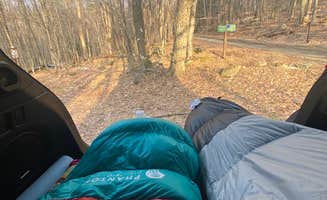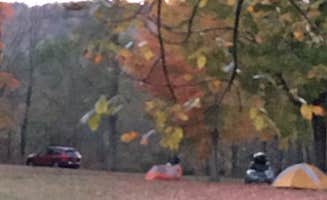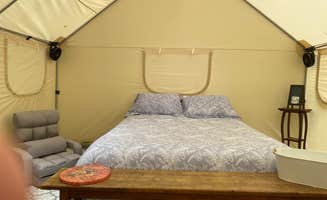Tent campsites in the Claremont area extend beyond the Appalachian Trail system to include several seasonal options within driving distance. The Connecticut River Valley region surrounding Claremont features camping opportunities in both New Hampshire and neighboring Vermont, with elevations ranging from 400 to 2,000 feet. Weather conditions can shift rapidly, particularly at higher elevations where temperatures often drop 10-15 degrees compared to the valley floor.
What to do
Swimming in natural settings: At Stony Brook Backcountry Shelter, campers can access a small swimming hole along Mink Brook. "I only explored a bit offtrail down the brook but found a decent swimming hole (could just barely submerge myself) to clean off a bit," notes one visitor who appreciated this natural feature.
Mountain climbing: The Cardigan Campsites serve as an excellent base for hiking Mount Cardigan. "Great spot to spend the night before a climb of Mt. Cardigan! Or after! The climb is challenging but shouldn't take too long. Great fire tower views at the top too!" reports a camper who used the site as a staging area for their summit attempt.
Rock jumping: Little Rock Pond offers more adventurous activities beyond basic swimming. "The pond is surprisingly warm for its altitude and it's home to two Common Loons. There's a huge jumping rock on the far side of the pond," according to a camper who found this natural feature noteworthy for recreation.
What campers like
Multi-level shelters: Some AT shelters in the region feature unique construction that campers appreciate. At Happy Hill Backcountry Shelter, "The shelter had a ground floor and a loft but each floor could maybe fit 4-5 people comfortably. The loft was nice since folks could decide to sleep up there while others were down below, either cooking, arriving, or departing."
New privies: Several backcountry sites have recently upgraded facilities. "The privvy was also new and very spacious," notes a visitor at Moose Mountain Backcountry Shelter, while another camper at Stony Brook mentioned, "The privvy looked brand new and was more spacious than most on the trail."
Bear boxes: Some sites offer secure food storage options. "There was also a bear box here, which I hadn't seen at other shelters along the AT in Vermont," reports a Stony Brook shelter user, highlighting this important safety feature not consistently available at all sites in the region.
What you should know
Water availability varies: Many tent sites near Claremont have inconsistent water sources. At Winturri Backcountry Shelter, a camper found that "Water was running when I was there in mid-August from a spring close to the shelter," but noted this can change seasonally.
Site flatness concerns: Finding level ground can be challenging at some locations. At Thistle Hill Backcountry Shelter, a camper observed it "seemed to have smaller spots for tent camping that were somewhat sloped," while Happy Hill offers "a bunch of level tent camp sites around the shelter."
Limited destination appeal: Many sites function better as stopover points than destinations. A camper at Moose Mountain noted, "This was a great place to stop along the Appalachian Trail but I wouldn't consider it worthy of a destination hike," a sentiment echoed at other backcountry sites in the region.
Tips for camping with families
Cost considerations: Managed sites may have minimal fees. At Little Rock Pond Group Camp & Shelters, "Operated by the Green Mountain Club caretaker who lives onsite, this campsite costs only $5 per person per night," making it affordable for family groups.
Wildlife viewing opportunities: Some sites offer chances to observe local species. Little Rock Pond is "home to two Common Loons," providing educational wildlife viewing for children interested in birds and aquatic ecosystems.
Space allocation: When traveling with larger family groups, consider sites with ample tent space. Winturri Backcountry Shelter offers "lots of tent camping spots as you worked up the hill perpendicular to the shelter" with "spaces with decent privacy," important for family camping arrangements.
Tips from RVers
Limited RV options: Traditional RV camping is scarce near Claremont, with most sites being primitive backcountry locations. Sunapee State Park Campground offers some of the few sites with electric hookups, water hookups, and sewer connections within reasonable driving distance of Claremont.
Seasonal availability: Most developed campgrounds with vehicle access operate on limited seasonal schedules. Sunapee State Park Campground operates from "May 26 to October 8," with no wintertime camping available for RVs in the immediate Claremont area.


